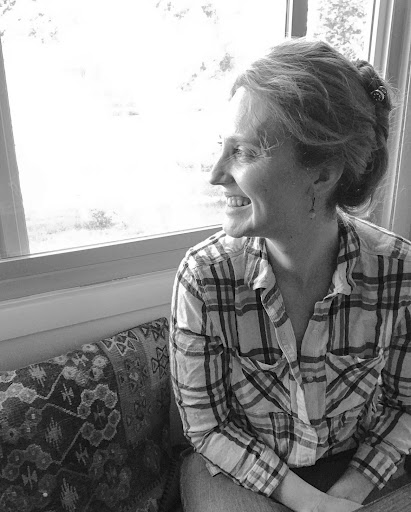
Jocelyn Skillman recently had the opportunity to connect with Seattle School alumni Christina Kemp MACP ‘17. Since graduating,Christina has worked as a realtor and an Adjunct Professor at Seattle University in their Department of Psychology. In 2019, she moved from Seattle to Bainbridge Island where she completed her first book. She is currently part of the Dance Faculty at Bainbridge Dance Center, has a small private practice, and in the last year her writing has been featured in various publications (Sidekick Press, 2021a; Sidekick Press, 2021b; Last Leaves Magazine, 2021). Jocelyn and Christina caught up and celebrated Christina’s new book Across the Distance: Reflections on Loving and Where We Did & Did Not Find Each Other-she shared a little about her process and her powerful formation through learning at The Seattle School.
Jocelyn Skillman: You wrote a book: Across the Distance! Is this your first? Could you share any parts of the genesis of it with us?
Christina Kemp: It is my first book. I think the origins of things are always a mystery because there are so many layers and points of reference to consider when we reflect on these questions. Did the writing begin with that poem I wrote when I was 13 that made its way inside the pages? Was it in my mid-20s when I was writing reflections on my experiences in particular relationships? I’ve asked myself this question (and been asked many times!), and sometimes feel I never fully understand the answer.
When I intentionally reflect on this in hindsight, I would say the beginnings of this book were taking place without my knowing what the writing was intended for. I’d always had a vision of being a writer and writing a book, even as a young child, but I never said anything about it to anyone because I was much too vulnerable to name that vision out loud. Yet writing felt so inherent and necessary, that I think I was very protective of both my writing process and the content of what was coming out as a developing aspect of my identity. For years, I simply just wrote and allowed these memories and reflections to move through me, I think in a way that was both of myself–and also something much deeper and greater than myself. I was very loyal to what I felt was supposed to move through me in the form of words, and so when felt the pull–almost as if I couldn’t not write–I just followed it. The majority of this book was written in solitude, with no one ever really knowing I was writing. I myself didn’t know what it was going to be until I began to look down at this collection of vignettes and allow myself to collage them into something more meaningful and specific with regard to frame. It didn’t take long then to see an assembly of something to work with in regard to an actual book.
JS: Were there any specific struggles and/or personal evolution you found yourself unearthing as you wrote?
CK: Many. I think it is impossible not to be transformed as you engage in creative works–though whether the process is transfiguring or devolving is sometimes debated, and maybe depends on your particular orientation with regard to human process. I tend to think whatever we discover about ourselves is always necessary because it’s real, and is intended to help us become more whole and integrated if we engage with ourselves intentionally. This was definitely my experience overall this go around…
In particular, my relationship to each of the people in this book was something I held with a deep sense of responsibility. Offering details about my own life experiences was one thing, but discerning what to include and omit with regard to what I have come to know and understand about the people in this book was a real point of contention for me. There are contents of other people’s lives that, if offered, would undoubtedly paint a more holistic picture for the reader with regard to some of the dynamics explored in these pages. But who am I to offer those details? I ultimately ended up omitting a lot, because I felt so heavily the weight of vulnerability I was already implicating each of these people in just by writing about them.
I didn’t feel this so much during the writing itself–because in those early stages I didn’t know what the writing was for, which in many ways was wonderful, because it allowed my experience to flow through me with uninterrupted honesty. But after the writing began to take form into something I realized could go into the world, I held the impact of that responsibility very heavily for a time, and in many ways still do. It’s one thing to expose yourself to others through an artform–which can be terrifying enough–and it’s another to expose others, in many ways without their consent. I can’t imagine what that must be like. Though I was intentional about making room for those conversations with a few of these people prior to publication, it doesn’t take the inherent vulnerability of that experience away…
Another point of (transfiguring) difficulty was the process of moving from the inner world of simply writing to forming the outer object of an actual book that was meant to be exposed to others. This was actually extremely uncomfortable for me, and I felt it almost viscerally in a nauseating sort of way that was quite intense during the months of actual publication. It was a bit disorienting for me and took me some time to come to terms with, even though in many ways the impact of that decision is only beginning to unfold and will continue to ripple out, and never be fully known or understood. Something about looking down and allowing a work to be finished––while our relationship to its contents is never in fact complete––was really extraordinary for me. I’m a very nostalgic person, and I sometimes think the sensitivity of nostalgia is so private… and yet here I was, releasing so much of those experiences and that felt sense out into the world. I was so grieved, proud, free within this experience of actually “becoming”, peaceful, surefooted, excited, and scared…
There was also an aspect of grief I experienced during the final stages of this process–after I finished the book, sent it out for publication, and was in many ways saying “goodbye”–that took me down to a level of intensity I hadn’t previously been able to access with regard to most of the relationships and experiences in this book. In particular, I felt the loss of my Dad in a place I hadn’t been able to get to before, and at one point weeping, I just kept saying, “My Dad is dead, my Dad is dead,” as if I’d never fully known it before. It was profound.
JS: How did your training from The Seattle School inform your work?
CK: Oh gosh, my time spent at The Seattle School absolutely did, though I’m not sure it was always direct. The 4 years I spent within the brick walls were so informative, and allowed me to unearth a more coherent understanding of myself and my story. None of that is separate from the act of writing.
Particular coursework–for example, psychopathology–constellated itself in the way I refined and defined what I wrote, but it wasn’t so much explicit as it was informing. I took what I learned from those years and continued to refine where my stance exists in relation to our complexities as people, in particular with regard to the relationship between our interiority and what exists in the spaces between ourselves, others and our environments, and also the spectrum of where spirituality intersects with our psychologies and the way we may interpret our experiences and what might be deemed mystical or pathological. This book doesn’t offer explicit analysis, but I hope what I offered was an honest willingness to name my own experience and an openness toward holding the complexities between our beauty, goodness, and love amid what is incomprehensible, harsh, wounded, and shattering–and also what is unknown. Fascinating stuff to consider, and the workings within the rooms at The Seattle School definitely provided a chrysalis for that process, which continues to be an ongoing metamorphosis for me.
I also think that in general, The Seattle School helped to make me a better writer simply by inviting and requiring its students to thread theory with personal narrative, and to do so concisely…
JS: What future work do you hope to engage?
CK: I would like to continue discovering what exists for me on the frontiers of being an artist, teacher, and healer, and what forms those few but intersecting paths will take in the coming years. It’s exciting to consider, but ideas of what those next steps could be are only beginning to emerge, and I tend to believe the earliest beginnings should be handled tenderly and with great care.
JS: What else would you love to share? Thank you so much, Christina!
CK: I have a very deep level of gratitude toward my professors at The Seattle School during my graduate studies. To be willing to formulate solid ‘enough’ stances with regard to the overwhelmingly complex narrative of what it means to be human, and offer perspectives that most people know can never be complete or all-encompassing, is really vulnerable. Somewhere we’re always falling short or missing someone or something, and yet we have to be willing to show up and offer what we do have anyway because if we don’t, there will never be growth or change. I have a lot of respect for what my teachers were willing to share of themselves and their experiences in relation to theory. They played a part in shaping me, spurring me to continue to ‘become’, and have impacted my lived experience for the better in a way that has extended far beyond those 4 years.


